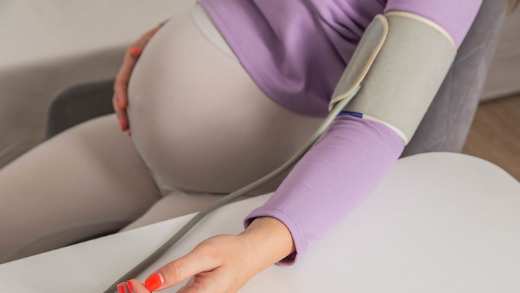Eclampsia
Learn about the causes, risks, and treatments for eclampsia.

What is eclampsia?
Eclampsia is a serious condition which can cause seizures due to high blood pressure in pregnancy.
It’s often a complication of pre-eclampsia, another condition that can happen in pregnancy.
High blood pressure can lead to swelling on the brain, followed by a seizure, either during pregnancy or rarely, just after the baby is born.
What’s the difference between eclampsia and pre-eclampsia?
If you’re more than 20 weeks pregnant, your midwife and antenatal team will be looking out for any signs of pre-eclampsia. Early warnings would be high blood pressure and protein in your urine (wee).
Further symptoms could include Footnote [1]:
- Problems with your vision, including blurring or flashing lights.
- A severe headache.
- Being sick.
- Your face, hands or feet swelling suddenly.
- Pain just below your ribs.
Pre-eclampsia is usually mild, but your team will keep a close eye on you in case anything changes.
Eclampsia is much more serious and can lead to stroke, coma, or death. It has the same warning symptoms as pre-eclampsia, but advances further to cause fits which are dangerous to mother and baby.
What causes eclampsia?
Although the cause of pre-eclampsia is not known, it’s thought to result from abnormal formation and function of the placenta. Footnote [1] The placenta is an organ that grows during pregnancy and is attached to the wall of the womb. It has a tube called an umbilical cord, which connects to the baby and provides oxygen and nutrients as well as removing waste products.
Who is at risk of eclampsia?
Some people are more at risk of developing eclampsia than others. This could be you if you have Footnote [1]:
- High blood pressure, or had it in a previous pregnancy.
- Had pre-eclampsia in a previous pregnancy.
- An autoimmune condition or kidney disease.
Your medical team will also be keeping an eye on your pregnancy if you’re:
- Expecting multiple babies.
- Are over 40.
- Over weight.
- Have a family history of pre-eclampsia.
- Have had a 10-year+ gap since your last pregnancy.
If you have two or more of these you could be at a higher risk of developing pre-eclampsia, which may develop into eclampsia.
If your doctor thinks you might be at high risk of developing pre-eclampsia you may be advised to take a 75-150mg daily dose of aspirin from the 12th week of pregnancy. This will continue until the baby is born.Footnote [2]
How is eclampsia diagnosed?
If you’ve got pre-eclampsia, your doctor may be testing you regularly to make sure it hasn’t developed into eclampsia. If you’re having fits, but haven’t got pre-eclampsia, the doctor may request the same tests.
These are:
- Blood tests – a complete blood count, to check your red blood cell and platelet count, kidney, and liver function.
- A creatinine test – if you’ve got too much in your blood it can indicate pre-eclampsia.
- A urine test – to check for protein.
How is eclampsia treated?
There is no cure for eclampsia and the best treatment is delivery of your baby.
But if it’s not an emergency, your doctor will consider how far along your pregnancy is, and if necessary, measures they can take to keep you both safe until your baby is due.
You will need to be hospitalised for full monitoring of the severity of the disease, and if you are having seizures, you may be given anticonvulsant drugs.
If you’re still at the pre-eclampsia stage your doctor may treat you with medication to try to lower your blood pressure and prevent it from turning into eclampsia.
You might also be given steroids to help your baby’s lungs mature if it looks like you might have to deliver the baby early.
You can use your cover to pay for treatment for eclampsia
You could use your health insurance cover to claim for treatment for eclampsia. The first step is to get a referral from your GP, or through our Digital GP app^. Then you can make a claim through MyAviva , over the phone, or online .
If we confirm that your claim meets the terms of your policy, we'll pay for the treatment directly. Just be sure to tell us if you need more tests or treatment, or if your hospital or specialist changes.
It’s good to have one less thing to worry about. It takes Aviva.
^ These services are non-contractual and can be withdrawn or amended by Aviva at any time.



